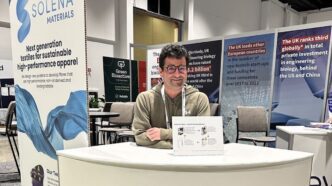The textile industry is drowning in plastic. Every year, over 60 million tonnes of synthetic fibres—mostly oil-based—flood the market, fuelling microplastic pollution and climate emissions. But one London startup is challenging the status quo with an entirely new kind of fibre.
Solena Materials, a biotech spinout from Imperial College London, has raised $6.7 million in seed funding to scale its AI-powered platform for designing high-performance, biodegradable protein fibres. These next-gen fibres are engineered from scratch—down to the molecular level—to deliver the performance of synthetics without the environmental toll. The round was led by billionaire investor and physicist Sir David Harding, with support from SynBioVen and returning backer Insempra.
Armed with fresh capital, Solena is moving to a larger space within Imperial’s White City Deep Tech Campus. The upgraded facility will house pilot-scale fibre spinning lines and automated bioreactors, a big step toward commercial manufacturing. The startup is also hiring across its strain development and lab operations teams as it shifts from research to production.
A Radical Rethink of How Fibres Are Made
Solena was founded in 2022 by Dr. James MacDonald, Professor Paul Freemont, and Professor Milo Shaffer—three Imperial College scientists with expertise in synthetic biology, structural biology, and materials chemistry. Together, they built a proprietary AI platform capable of designing novel proteins that don’t occur in nature. These proteins form the foundation of Solena’s fibres.
Instead of extracting materials from plants or refining oil, Solena programs gene-edited microbes to produce fibres using renewable feedstocks. The result? A cleaner, scalable alternative to traditional synthetics like polyester and even resource-heavy natural fibres like cotton.
What sets these fibres apart is control. Solena’s technology allows it to tailor strength, stretch, hand-feel, and moisture-wicking properties with surgical precision. Whether for athletic wear, medical textiles, or fashion, the material is purpose-built for performance and sustainability.
Dr. MacDonald, who serves as CEO, believes this “first principles” approach is key. Rather than tweaking what nature offers, Solena designs fibres for exact use cases—and builds them from the ground up.
AI-Designed Fibres That Outperform the Status Quo
At the core of Solena’s platform is a deep learning engine trained to optimize fibres for industrial needs. It can generate entirely new protein sequences engineered for strength, elasticity, biodegradability, and manufacturability. This unlocks a new world of materials science—where custom fibres are designed digitally and produced biologically.
By shifting away from fossil fuels and embracing synthetic biology, Solena avoids the pitfalls of both traditional synthetics and many natural fibres. It’s a win for performance and the planet.
Co-founder Professor Paul Freemont calls it a game-changer. For the first time, we’re not stuck with what nature provides. Solena can now create protein fibres from scratch, built to meet precise performance specs.
Launching in High-Performance Markets First
Rather than go head-to-head with mass-market cotton or polyester, Solena is starting where performance matters most—athletic wear, technical apparel, and medical-grade textiles. These segments offer higher margins and faster adoption for new materials.
Professor Milo Shaffer highlights the broader shift this represents. Solena is not just launching a new fibre—it’s reimagining the discovery and scaling process for materials, using AI and automation to dramatically speed up development.
With tightening EU regulations on microplastics—set to reduce up to 500,000 tonnes of emissions annually by 2030—brands are actively seeking cleaner alternatives. Solena already has partnerships in motion with fashion labels aiming to debut garments made with its fibres by 2026.
By merging synthetic biology, AI, and textile engineering, Solena Materials is paving the way for a more sustainable—and smarter—future of fashion.













